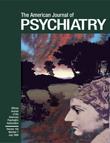Earlier Puberty as a Predictor of Later Onset of Schizophrenia in Women
Abstract
OBJECTIVE: The aim of this study was to determine whether puberty plays a mediating role in onset of schizophrenia. The hypothesis was that there is an inverse relation between age at puberty (menarche) and age at onset in women. METHOD: Competent and consenting individuals with DSM-IV-defined schizophrenia or schizoaffective disorder and their mothers underwent a 45-minute interview to ascertain age at first odd behavior, age at first psychotic symptoms, age at first hospitalization, and ages at various indices of puberty. Information about substance use, head injury, perinatal trauma, and first-degree family history of schizophrenia was also obtained. RESULTS: In the women (N=35), the earlier the age at menarche, the later the ages at both the first psychotic symptoms and the first hospitalization. There was no significant association between puberty and onset in the men (N=45). Other than gender, none of the examined variables played a role in the interaction of puberty and onset of illness. CONCLUSIONS: In women, early puberty (whether through hormonal or social influence) was associated with later onset of schizophrenia. This effect was not found in men; in fact, the trend was in the opposite direction.



